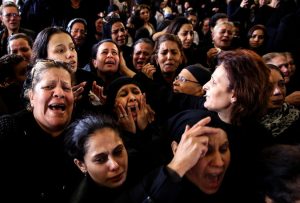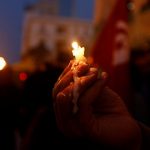By Declan Walsh – The New York Times –
When the bomb went off at St. Mark’s Cathedral one week ago, William Frances had one thought: “Oh, my God, it’s happening again.”
Six years earlier, Mr. Frances lost his mother, his sister and a cousin in a bombing at another Alexandria church that left him devastated. Now he prayed he hadn’t lost anyone else.
“I had enough,” he recalled. “I said: ‘Please, God, no more. Please.’”
The coordinated suicide attacks on St. Mark’s, Egypt’s historic seat of Christianity, and at another church, in the city of Tanta, took 45 lives and dealt a heavy blow to the country’s embattled Coptic Orthodox minority. The Islamic State group claimed responsibility for both attacks.
The bombing in Alexandria, a bustling seaport of crumbling elegance, also dredged up painful memories of 2011 church attack that, despite years of investigation, remains unsolved. The trail is stone cold: Not only have the Egyptian police failed to arrest those responsible for the bloodshed, they can’t even say which group carried it out.
Ineptitude? Indifference? As Christians in Alexandria mourned the latest victims, some wondered if this time it would end differently. Not Mr. Frances.
“Nothing has changed,” Mr. Frances, a 29-year-old computer technician, said in a cafe on the city’s sweeping seafront boulevard. “It happened six years ago, it happened this week, and it will happen again. I don’t feel safe in this country.”
His hard-bitten skepticism mirrors that of many Egyptian Christians, who say they have lost faith in a system that swings between an apathetic shrug and outright discrimination.

Egypt’s strongman leader, President Abdel Fattah el-Sisi, styles himself as a staunch defender of Copts, who account for one-tenth of the country’s 92 million people, and who openly rejoiced when he came to power in 2013.
Yet Copts have had little to celebrate under Mr. Sisi, and find themselves still vulnerable to prejudice, violence and the vagaries of a system in which impunity is rife.
Joseph Malak, a lawyer representing families of the 2011 victims, said a court order he won in October required the Interior Ministry to provide an update on the investigation. He has received nothing.
To people like Mr. Frances, the latest attack was a reminder of how little has changed. “Another president, another regime — it’s all the same,” he said.
Now the Islamic State hopes to bomb its way into the equation. Since a suicide bombing at a Cairo church in December, the Islamic State has trumpeted its intention to seek a foothold in Egypt by slaughtering vulnerable Christians. Its choice of Alexandria, an ancient center of Christendom, for the latest escalation was a marker of its ambitions.
St. Mark arrived here in A.D. 64, according to church teaching, befriending a shoemaker who became his first bishop. Together they established their first church on a site that is now home to a grand cathedral, with giant chandeliers, walls lined with icons and St. Mark’s head preserved in its vaults.
Last weekend, as the Coptic patriarch, Pope Tawadros II, offered Palm Sunday Mass, a suicide bomber roamed nearby streets looking for a way inside. It was not easy: Egyptian security officials guarded the main approach streets.
But once the Mass ended and the pope had retired to his chambers, the security cordon relaxed. Amgad Bakheet, a rickshaw driver, saw a man walk up to the church gates with his jacket zipped high and one hand hidden.
As the man passed through a security gate with a metal detector, Mr. Bakheet said, he heard beeping. The man stepped back. Mr. Bakheet was flung to the ground, his body peppered with shrapnel.
“I called out to St. George,” he said at his hospital bed Wednesday, wincing from pain, as a friend showed a photo of the metal that medics had pulled from his flesh.
Four police officers, seven Christians and six Muslim passers-by perished in the attack. Hours later, Mr. Sisi declared a state of emergency that gave him sweeping powers to try terrorism suspects in emergency courts. In a show of force, soldiers fanned out across the country to guard churches, while armored vehicles took up positions in the streets.
The Interior Ministry identified the Alexandria bomber as Mahmoud Hassan Mubarak Abdallah, a petroleum worker who had returned to his home in Suez from Kuwait last year.
In a television interview, Mr. Abdallah’s wife said she had last seen her husband when he told her that he was leaving for Nigeria in December. It was unclear if he had gone.
Yet even as Mr. Sisi, in a visit with Pope Tawadros in Cairo on Thursday, vowed to track down those behind the bombings, a crowd set fire to three Christian homes in Minya, 125 miles south of the capital, in a dispute over church-building. It was a stark reminder of the sectarian wellspring the Islamic State hopes to exploit.
A church-building law, passed last year, discriminates against Christians. Mob attacks stoked by rabble-rousers and Islamist ideologues, like the one in Minya, are rarely prosecuted. Few Christians serve in the top ranks of the military, security services and academia.
“The highest people can never be Christian,” said Michael Wahid Hanna, an Egypt expert at the Century Foundation in New York. “They never are. It’s systemic.”
Ibrahim Khalaf Fahmy, a resident of the Minya village where clashes erupted on Thursday, described a situation of boiling frustrations.
“The Muslims insult us and spit in our faces, even before the police,” Mr. Fahmy said by telephone. Mr. Sisi’s state of emergency had been imposed “not to protect the Copts,” he said, “but to prevent a revolt of the Copts.”
Violence against Christians is rare in Alexandria, a city with a rich literary and intellectual tradition. Even so, many complain of less visible forms of discrimination that sting nonetheless.
Dawd Suleiman, who lost his wife and a daughter in the 2011 attack, stepped out of evening prayers recently for an interview at one of the many cafes lining Alexandria’s seafront.
Mr. Suleiman, a retired mechanic, recounted how the previous blast had ruined his life. His daughter Marina, who narrowly survived, suffered continuing psychological trauma, he said.
Mr. Suleiman’s one hope was to get a job for his son, Kyrillos, in the state-run petroleum company where he had worked for 37 years. (Such unofficial sinecures are considered a virtual right in many state companies.) But the job, which he said management had promised, was blocked by a single bigoted supervisor, he said.
Kyrillos left Egypt for Germany, where he works for a railway company. “It’s the small things that hurt,” Mr. Suleiman said.
Suffering and martyrdom occupy a central place in Coptic tradition. Persecution by Roman emperors or Islamic invaders is recounted during religious services. The church calendar begins in 284, the start of the reign of the Roman emperor Diocletian, who terrorized Christians.
The veneration of Christian martyrs is felt most keenly at the monastery of St. Mina, an hour’s drive from Alexandria. There, barren desert has been transformed into a lush compound of gardens and monastic cells around a soaring cathedral. The seven Christians killed in last Sunday’s bombing were taken there for entombment in a martyr’s church under construction for the 2011 bombing’s 23 victims.
“The new martyrs will be buried beside the old ones,” Bishop Kyrillos Ava Mina, leader of the monastery, said as he walked around the site, weaving through a maze of wooden beams. “It is a gift for them to be buried here.”
Coptic clerics will welcome Pope Francis when he visits Egypt on April 28. On Friday, Pope Tawadros canceled most Easter Sunday festivities, limiting them to a simple Mass.
Many Coptic clerics are careful of engaging in public debate. Asked what was driving the Islamic State attacks, the monastery’s spokesman, Father Elijah Ava Mina, chuckled dryly. “I don’t know,” he said. “Ask them.”
Yet talk of Copts being forced to leave Egypt en masse, as some have suggested, seems overblown.
Attendance at Holy Week services at St. Mark’s Cathedral in Alexandria soared after the bombing, clerics said, as worshipers defied their fears and crowded into a church whose pillars and altars were shrouded in black cloth.
On Friday, George Naseem Fahim stood guard at the church gates. His father, Naseem Fahim, was killed in the blast Sunday, he said, after he directed the suicide bomber away from the main gate and into the metal detector.
Now his son took his place.
“I’m continuing what he started,” Mr. Fahim said. “Why worry or be afraid? He has gone to heaven, and I am ready to join him if necessary.”
___________________
Magdy Samaan contributed reporting.
Photo 1: The funeral for those killed in the Palm Sunday suicide bombing at St. Mark’s Cathedral in Alexandria, Egypt. Credit Samer Abdallah/Associated Press
Photo 2: Mourners at the funeral for victims of the suicide bombing at a Coptic Christian church in Alexandria, Egypt. Credit Samer Abdallah/Associated Press





